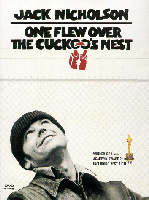|







 
|
 |
One
Flew Over the Cuckoo's Nest (1975)     
 |
Director:
Milos
Forman |
COUNTRY
USA |
Genre
Drama |
NORWEGIAN TITLE
Gjøkeredet |
RUNNING TIME
133
minutes |
|
Producers:
Sael
Zaentz
Michael Douglas |
Screenwriter (based on
the novel by Ken Kesey):
Lawrence
Hauben
Bo Goldman |
Review
20th century psychiatry and institutionalism were given a heavy, but
arguably well-deserved and nuanced blow when Milos Forman adapted Ken
Kesey's acclaimed novel about mental illnesses and treatments – and,
according to Kesey and Forman, the often heavy discrepancies between the
two. The site is an arguably fairly run-of-the-mill mental asylum in the
1970s, the cast of characters an expected collection of nervous,
delusional, schizophrenic and/or psychotic men. And then there is R. P.
McMurphy, a 30-something short-tempered but good-hearted rebel who seems
to never have grown up. He is serving a sentence for petty crimes and
jumps on the chance to become transferred to a mental institution, which
he believes will be a more relaxing serving of his sentence than regular
prison labour camps. And through Jack Nicholson's perfectly identifiable
McMurphy, a character most of us have either been, befriended or dated
at some point during our youth, Forman paints the darkest of his many
dark portraits of institutionalism. The cold-hearted administrator Nurse
Ratched comes off and feels as a large-scale movie villain, but the most
scary interpretation of her is that she's not evil, but simply too
arrogant and soulless to realize that the theories and doctrines she
bases her choices on are wrong. Ratched was probably a dead-ringer for
numerous doctors and nurses working in mental institutions during the
mid 20th century.
Seen with a great deal of distance, One Flew Over the Cuckoo's Nest's
social criticism may not be as relevant anymore; institutions and mental
health care has gone through major reforms since. But the film, like so
many of Milos Forman's other films, still works brilliantly because of
the vibrant human drama it offers. Jack Nicholson is seething with
energy, and the interplay between him and a chillingly authentic Louise
Fletcher as Nurse Ratched elevates the drama to thriller-level suspense.
There are also a number of fine supporting performances, the best of
which belongs to Brad Dourif in what must be one of the best
screen-debuts of all time. To say his career never lived up to this
promise would be an enormous understatement, but his work as Billy
Bibbit lives on, and so does the rest of Forman's tragic and well-aimed
elegy.
|
|